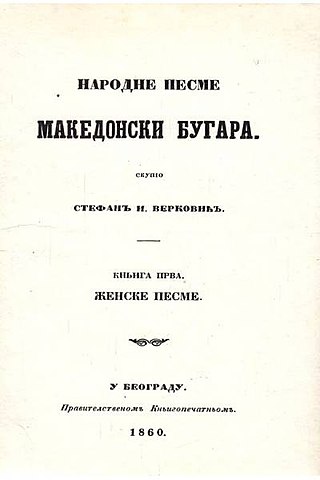Loading AI tools
Collection of folk songs From Wikipedia, the free encyclopedia
Folk Songs of the Macedonian Bulgarians[1] (Serbian: Народне песме Македонски Бугара, Bulgarian: Народни песни на македонските българи,[2] Macedonian: Народни песни на Македонските Бугари)[3] is an ethnographic collection of folk songs collected by Stefan Verković, considered to be his most valuable contribution in the field of Bulgarian folklore.[4] It was published in Serbian in 1860, in Belgrade.[5]

The book contains 335 folk songs that are lyrical and were therefore called female by Verković. The songs were collected by him during his time as a Serbian ethological agent in then-Ottoman town of Serres (today in Greece). The collected material was from the eastern parts of the Macedonian region.[6] The title, preface, notes and explanations of the songs are in Serbian, and at the end there is an explanation of some unknown words in Serbian. However, the songs are in their original form. In the preface, Verković states that he called the songs "Bulgarian" as opposed to Slavic because "if you ask a Macedonian Slav "What are you?", he will immediately answer to you: "I am Bulgarian and I call my language Bulgarian".[5][7] He also clarifies that the Macedonian Bulgarians were called Slavs in the books of Cyril and Methodius and their disciples (9th century), and later they did adopt the name "Bulgarian", which was a political, rather than an ethnic name.[5][8][9] Verković states that he was planning to publish a second volume of the collection. Due to his involvement in the Veda Slovena debate, he was unable to publish the second volume and the materials he collected were published as "Сборникъ Верковича. Ι. Народныя пѣсни македонскихъ болгаръ" (Verković's Collection. Folk Songs of the Macedonian Bulgarians) in 1920 in Petrograd.[10]
In 1961 the book was re-published by Kiril Penušliski in Skopje under the title "Македонски народни песни" (Macedonian Folk Songs),[11] although Verković did not describe in his collection any presence of Macedonian identity then.[12] All references to 'Macedonian Bulgarians' and the original foreword explaining the Bulgarian ethnicity of the Macedonian Slavs were removed from the book.[11] According to Bulgarian sources, its goal was: "the obliteration of the Bulgarian historical and collective memory and building a new Macedonian national identity on its place."[13]
The book was re-published for the second time in Bulgarian by Petar Dinekov in 1966. In addition to the original text, a translation into Bulgarian of Verković's preface was made and an introductory study was added.[14]
Seamless Wikipedia browsing. On steroids.
Every time you click a link to Wikipedia, Wiktionary or Wikiquote in your browser's search results, it will show the modern Wikiwand interface.
Wikiwand extension is a five stars, simple, with minimum permission required to keep your browsing private, safe and transparent.